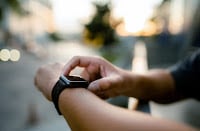APA strongly supports the U.S. Food and Drug Administration’s proposed reclassification of...
Wearable Technology Could Change Depression Care, Review Suggests

About a third of U.S. adults use a wearable device (for example, a smartwatch) to track their health and fitness. These devices (also known as “wearables”) capture a large amount of information that could be used one day to enhance how depression is diagnosed, monitored, and treated, wrote Szymon Fedor, Ph.D., of MIT Media Lab and colleagues from Massachusetts General Hospital in a review article in the New England Journal of Medicine.
As the authors explained, the diagnosis and monitoring of depression today is based largely on symptoms reported by patients, which is subjective. However, wearables provide objective information by passively collecting physiological and behavioral information—that is, users do not need to input this information.
“Complementing patient self-reports, … measurements [from wearables] increase the information available for differential diagnosis or treatment planning,” they wrote. Additionally, “[l]ongitudinal measurements help establish patient-specific behavioral and physiological baselines and support identification of personalized factors that result in deviations from these norms.”
Data obtained from a patient’s wearable could also influence how clinicians structure their time during visits with the patient, they continued. “In this proposed scenario, clinicians could use their limited time with patients more efficiently, gathering insights not provided by a wearable, thus forming a better therapeutic relationship and delivering personalized treatment.”
The authors shared insights on how to analyze data from wearables and presented a case study of wristband data collected from a 21-year-old woman diagnosed with major depressive disorder who recently began a new treatment. They concluded the article with a summary of obstacles limiting the use of wearable technology in clinical practice and how to overcome these obstacles.
For related information, see the Psychiatric Services article “Digital Mental Health and Its Discontents: Assumptions About Technology That Create Barriers to Equitable Access.”
(Image: Getty Images/iStock/Krisada tepkulmanont)
Don't miss out! To learn about newly posted articles in Psychiatric News, please sign up here.





